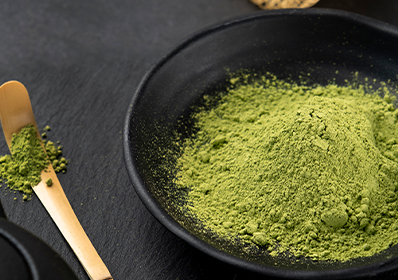What is Matcha?
Matcha is a finely ground green tea powder that stands out for its exceptionally high levels of antioxidants, particularly epigallocatechin gallate (EGCG), as well as L-theanine and chlorophyll, which together provide powerful skin benefits. Matcha uses the whole leaf, resulting in significantly higher potency. For the skin, matcha helps reduce inflammation and redness, protect against free radical and UV damage, support collagen and elastin production for firmness, and revive dull complexions with a healthier, more radiant look.
Effect of Matcha On Skin Barrier:
1. Antioxidant Protection:
EGCG and other catechins neutralize free radicals and reactive oxygen species, protecting skin cells from oxidative stress.
2. Anti-Inflammatory Action:
Catechins inhibit inflammatory mediators like NF-κB, TNF-α, and COX-2, reducing redness, swelling, and irritation.
3. Skin Regeneration & Anti-Aging:
Catechins stimulate collagen and elastin production, enhance hyaluronic acid synthesis, reduce melanin formation, and promote firmer, hydrated, and brighter skin.
Research Insights
Skin Hydration & Barrier Support: Matcha’s main catechin, EGCG, has been shown to upregulate natural moisturizing factor (NMF) genes like filaggrin (FLG), hyaluronic acid synthases (HAS-1, HAS-2), and transglutaminase-1 in keratinocyte (HaCaT) cell models. This suggests improvement in skin hydration, barrier repair, and moisture retention.
Anti-Aging / Structural Improvement: Matcha exhibits antiglycative effects and decreases markers of oxidative damage that degrade skin matrix (collagen, elastin). The antioxidant + anti-inflammatory effects help preserve skin integrity and slow aging processes.
Anti-Inflammatory Effects: In animal-based studies, dietary matcha reduced inflammatory markers and systemic inflammation exposed to stressors (e.g. particulate matter PM₂.₅) including in skin tissues.
- Applications in Skin Care Products:• Anti-aging creams and serums: To protect collagen, prevent glycation, and reduce wrinkles.• Brightening formulations: To reduce oxidative stress, regulate melanin production, and even out skin tone.• Moisturizers and hydrating masks: For enhancing skin barrier function and water retention.• Acne treatments: Using antimicrobial and anti-inflammatory activity to calm breakouts and balance oily skin.• Sun care products: As a natural antioxidant and photoprotective booster to limit UV-induced damage.• Soothing gels and repair ointments: To reduce redness, irritation, and support regeneration of sensitive or stressed skin.ConclusionMatcha is a powerful skincare ingredient rich in EGCG, offering antioxidant, anti-inflammatory, and anti-aging benefits. It protects collagen, enhances hydration, and improves skin tone, making it ideal for brightening, barrier repair, and overall skin health.ReferencesHsu S. et al. Green tea polyphenols induce genes related to NMF and barrier function in human keratinocytes (HaCaT). Journal of Dermatological Science. (2018) PMID:29316635/https://pubmed.ncbi.nlm.nih.gov/29316635/Li Y. et al. Matcha green tea alleviates particulate matter (PM2.5)–induced inflammation via NF-κB and TLR signaling pathways in mice. Frontiers in Nutrition. (2022) PMC8750520https://pmc.ncbi.nlm.nih.gov/articles/PMC8750520/?utm_






